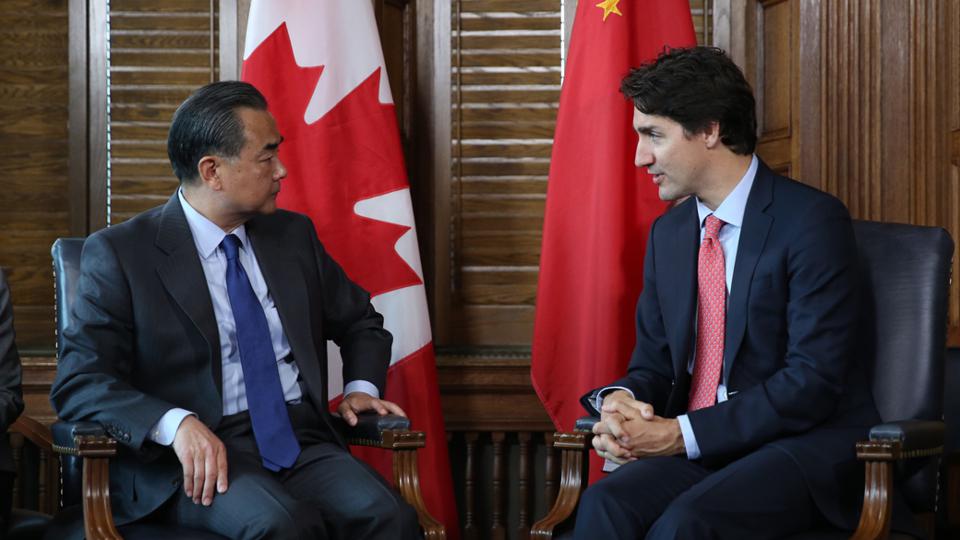She suffered on work farms during China's cultural revolution and was eyewitness to the Tiananmen Square massacre. Now, journalist and author Jan Wong says Prime Minister Justin Trudeau must show some backbone if he truly wants to influence Beijing on human rights.
Wong said a bold, direct push for amnesty for some Chinese dissidents and action on other human rights concerns could actually create an edge for Canada in dealing with China, but Trudeau doesn't seem to realize it.
“The Chinese wouldn't want him to not be on their side,” she said, adding Trudeau needs to take a leadership role on moral questions in dealings with China.
Wong, a professor in journalism at St. Thomas University, has written a number of books on China, including her acclaimed memoir Red China Blues: My Long March from Mao to Now.
The book describes Wong's personal journey as a Canadian who moved to China to study during the cultural revolution in the early 1970s and tells a raw story of life in China both before and during the government’s efforts to open its closed society to the world.
Wong said the federal government has showed that it doesn't have a deep enough understanding of China. The government, for example, doesn’t grasp the cachet Trudeau has in China or how to use it to advance Canada’s positions.
“I think he's trying to look like he's being engaged while putting most of his efforts into trade negotiations,” Wong said. “There's a little bit of window dressing.”
Wong said the window dressing has included the high-profile release of Kevin Garratt, a Canadian held by Beijing since 2014 on allegations of spying and stealing state secrets.
But Trudeau, or “little potato” as he's nicknamed in China because his name sounds like the Mandarin word for potato, could be achieving much more, Wong said, particularly as China, grappling with public relations issues like territorial disputes in the South China Sea, is trying to improve its image.
Trudeau is “fresh-faced” and popular with a massive social media following, she said, and the Chinese government wants to be seen as his chum.
Trudeau is also popular because his father, former prime minister Pierre Trudeau, strengthened relations with China at time when most Western nations wouldn’t recognize the country’s government.
Wong noted that Premier Li Keqiang held an informal dinner for Trudeau when the prime minister visited China in September. The Chinese government never arranges such dinners, she said, and it signalled that Trudeau had won a level of affection unmatched by any other world leader, she said.
Chinese reporters also clamoured to get selfies with Trudeau during his trip, something Wong said is “not normal.”
His pedigree and special position make Trudeau the world leader most able to achieve change in China with the least political risk.
But Wong said Trudeau is not using his leverage effectively.
“I believe he has the history behind him, I believe he has his popularity and I think he can do it,” Wong said. “But I don't know if he knows. I don't know if he understands.”
Canadian governments have expressed concern over human rights in China, but been vague about their efforts to push for change.
During his China visit, Trudeau said he encouraged Chinese President Xi Jinping to protect human rights and free expression, but offered no details of the conversation.
Critics have accused Canada of having a “servile” relationship with China and failing to understand the country.
In June, Foreign Affairs Minister Stephane Dion was criticized for standing by silently as China's Foreign Minister Wang Yi accused a Canadian reporter of arrogance and anti-China prejudice when she asked about human rights concerns and territorial disputes with its neighbours. The following day, Trudeau said he and Dion expressed “dissatisfaction” with Wang and the Chinese ambassador over the incident.
Wong said there is no reason to walk on eggshells around China in the interest of trade. Or to follow the approach of the former Conservative government, which cast a nine-year chill on relations with China.
China is not monolithic, Wong said, and while there are “bullies” like Wang, there are also millions of people in the country ashamed by his actions that day.
In fact, she said, a more outspoken and principled stance from Trudeau could lead to better deals for Canada.
“I think the Chinese actually respect people who speak up,” Wong said. “And they don't respect people who grovel.”
The litmus test for the Liberal government on China's human rights issues is if it gets results, Wong said. If it does not, Wong said, the government isn't doing enough.
At this moment in history Trudeau has a real chance to make a difference, and he must be assertive and seize it or “we'll be standing on the sidelines looking semi-pathetic cause we're not very big and we won't have a leadership role when it comes to relations with China,” Wong said.
“Right now Trudeau has moral authority, he should not squander it.” ![]()
Read more: Rights + Justice, Politics















Tyee Commenting Guidelines
Comments that violate guidelines risk being deleted, and violations may result in a temporary or permanent user ban. Maintain the spirit of good conversation to stay in the discussion.
*Please note The Tyee is not a forum for spreading misinformation about COVID-19, denying its existence or minimizing its risk to public health.
Do:
Do not: